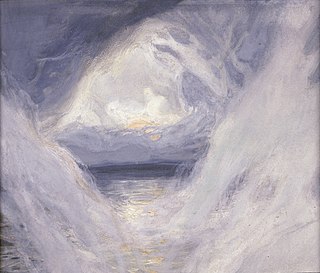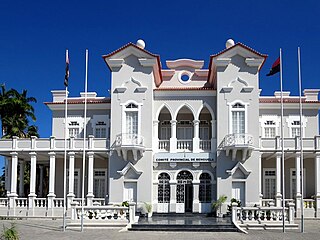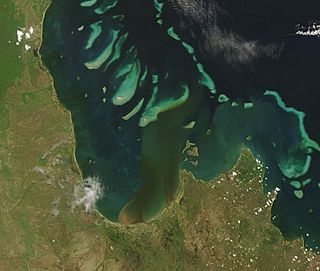
A creation myth or cosmogonic myth is a type of cosmogony, a symbolic narrative of how the world began and how people first came to inhabit it. While in popular usage the term myth often refers to false or fanciful stories, members of cultures often ascribe varying degrees of truth to their creation myths. In the society in which it is told, a creation myth is usually regarded as conveying profound truths – metaphorically, symbolically, historically, or literally. They are commonly, although not always, considered cosmogonical myths – that is, they describe the ordering of the cosmos from a state of chaos or amorphousness.

The Encyclopædia Britannica is a general knowledge English-language encyclopaedia. It has been published by Encyclopædia Britannica, Inc. since 1768, although the company has changed ownership seven times. The encyclopaedia is maintained by about 100 full-time editors and more than 4,000 contributors. The 2010 version of the 15th edition, which spans 32 volumes and 32,640 pages, was the last printed edition. Since 2016, it has been published exclusively as an online encyclopaedia.

Smelts are a family of small fish, the Osmeridae, found in the North Atlantic and North Pacific oceans, as well as rivers, streams and lakes in Europe, North America and Northeast Asia. They are also known as freshwater smelts or typical smelts to distinguish them from the related Argentinidae, Bathylagidae, and Retropinnidae.

Fishing is the activity of trying to catch fish. Fish are often caught as wildlife from the natural environment, but may also be caught from stocked bodies of water such as ponds, canals, park wetlands and reservoirs. Fishing techniques include hand-gathering, spearing, netting, angling, shooting and trapping, as well as more destructive and often illegal techniques such as electrocution, blasting and poisoning.

Ava Lavinia Gardner was an American actress. She first signed a contract with Metro-Goldwyn-Mayer in 1941 and appeared mainly in small roles until she drew critics' attention in 1946 with her performance in Robert Siodmak's film noir The Killers. She was nominated for an Academy Award for Best Actress for her performance in John Ford's Mogambo (1953), and for best actress for both a Golden Globe Award and BAFTA Award for her performance in John Huston's The Night of the Iguana (1964). She was a part of the Golden Age of Hollywood.

In Greek mythology, Hermaphroditus was a child of Aphrodite and Hermes. According to Ovid, he was born a remarkably handsome boy whom the naiad Salmacis attempted to rape and prayed to be united with forever. A god, in answer to her prayer, merged their two forms into one and transformed him into a hermaphrodite, he being considered the origin of the name. His name is compounded of his parents' names, Hermes and Aphrodite. He was one of the Erotes.

Margaret, known as Margaret of Antioch in the West, and as Saint Marina the Great Martyr in the East, is celebrated as a saint on 20 July in Western Christianity, on 17 July by the Eastern Orthodox Church, and on Epip 23 and Hathor 23 in the Coptic Orthodox Church.

The Nixie, Nixy, Nix, Näcken, Nicor, Nøkk, or Nøkken are humanoid, and often shapeshifting water spirits in Germanic mythology and folklore.

Recreational fishing, also called sport fishing or game fishing, is fishing for leisure, exercise or competition. It can be contrasted with commercial fishing, which is professional fishing for profit; or subsistence fishing, which is fishing for survival and livelihood.

Benguela is a city in western Angola, capital of Benguela Province. Benguela is one of Angola's most populous cities with a population of 555,124 in the city and 561,775 in the municipality, at the 2014 census.

The Tapti River is a river in central India located to the south of the Narmada river that flows westwards before draining into the Arabian Sea. The river has a length of around 724 km (450 mi) and flows through the states of Maharashtra, Gujarat and Madhya Pradesh. It flows through Surat, and is crossed by the Magdalla, ONGC Bridge.

Princess Charlotte Bay is a large bay on the east coast of Far North Queensland at the base of Cape York Peninsula, 350 km north northwest of Cairns. Princess Charlotte Bay is a part of the Great Barrier Reef Marine Park and it is a habitat for the dugong.

John Dory, St Pierre or Peter's fish, refers to fish of the genus Zeus, especially Zeus faber, of widespread distribution. It is an edible demersal coastal marine fish with a laterally compressed olive-yellow body which has a large dark spot, and long spines on the dorsal fin. Its large eyes at the front of the head provide it with binocular vision and depth perception, which are important for predators. The John Dory's eye spot on the side of its body also confuses prey, which are scooped up in its big mouth.

"The Twa Sisters" is a traditional murder ballad, dating at least as far back as the mid 17th century. The song recounts the tale of a girl drowned by her jealous sister. At least 21 English variants exist under several names, including "Minnorie" or "Binnorie", "The Cruel Sister", "The Wind and Rain", "Dreadful Wind and Rain", "Two Sisters", "The Bonny Swans" and the "Bonnie Bows of London". The ballad was collected by renowned folklorist Francis J. Child as Child Ballad 10 and is also listed in the Roud Folk Song Index ., Whilst the song is thought to originate somewhere around England or Scotland, extremely similar songs have been found throughout Europe, particularly in Scandinavia.
A fishery is an area with an associated fish or aquatic population which is harvested for its commercial value. Fisheries can be wild or farmed. Most of the world's wild fisheries are in the ocean. This article is an overview of ocean fisheries.

Tsuritama (つり球) "fishing ball", sometimes written as tsuritama, is a Japanese anime television series that aired between 13 April 2012 and 28 June 2012. The anime was licensed by Sentai Filmworks in North America, by MVM Films in the United Kingdom, and Hanabee in Australia and New Zealand.

Dust Tracks on a Road is the 1942 autobiography of black American writer and anthropologist Zora Neale Hurston.

The sjörå(in Swedish), or the Sjöfru was a mythical creature of the lake, or Rå, in Swedish folklore. She is a female, humanoid water spirit. She is a seductive creature, often featured sitting and combing her long, sweeping hair with delight, and often lures and drowns men who are unkind, unfaithful or otherwise disrespectful to her or the lake. Like all other rå (keepers) she protects her domain and awards those kind to her with good fishing luck and saves them from drowning. In wintertime she would sometimes stick her hand up from the waters. If the visitor then gave her a mitten she would thank him for his kindness with gifts or protect him in his time of need.
The Battle of Chausa was a notable military engagement between the Mughal Emperor, Humayun, and the Afghan warlord, Sher Shah Suri. It was fought on 26 June 1539 at Chausa, 10 miles southwest of Buxar in modern-day Bihar, India. Sher Shah Suri was assisted by his allies, the Ujjainiya Rajputs of Bhojpur and Gautam Rajputs who were led by the commander, Gajpati Ujjainia. Humayun escaped from the battlefield to save his life. Sher Shah was victorious and crowned himself Farīd al-Dīn Shēr Shāh.

















